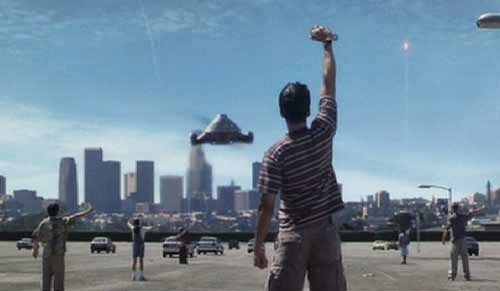Okay, so maybe I'm overselling. A bit. But I watched it two nights ago, and this has been simmering ever since.
 |
| It doesn't stream. A crime. |
It seems like all of my posts for this new blog have dealt in one way or another with the power and pleasure of fandom. The first three films I wrote about were documentaries explicitly about fans. Jiro Dreams of Sushi is a movie about obsession--the chefs obsessed with creating artful sushi, and the consumers and food writers who experience and celebrate the results of their experimentation and expertise.
An element of Mary and Max that I didn't mention in my review, but that immediately resonated with me and my partner, was that the bond between these two very different characters was partly forged through and sustained by their shared love for a cartoon.
 |
| They have all the action figures! |
All of these films suggest that being a fan is a *language*. Fandom gives one access to a shared vocabulary with which to speak yourself into being (through fan art, fanfic, ahem, writing blogs); or a way to speak to others (through conventions, message boards); or both--through simply (though what can be more complicated and revelatory) articulating your love for a cultural text. Galaxy Quest includes, intensifies, and celebrates all of these aspects of fandom's grammar.
"Galaxy Quest" is both the title of the film and the fictional sci-fi television series that gives the narrative its shape. And in the seeming redundancy of "fictional television series" lies the argument of the movie. Aren't all television series fictional? Are you sure about that? Galaxy Quest puts its cinematic finger on the sore spot of this question and pushes. Hard.
Any serious fan of a created universe has encountered some version of the question: You know it's all made up, right? Depending on the answer, this question is usually followed up by the helpful descriptor, "It's just a [t.v. show, movie, book, etc.] and perhaps some version of the directive to, well, get a life.
By answering the question with an audacious, "it's not," the plot of Galaxy Quest refutes and undoes the premise governing the directive. Galaxy Quest, we learn, was a popular sci-fi show in what looks to be the early 80s, and is clearly a thinly veiled citation of the Star Trek universe. We have a "handsome" and narcissistic captain,
 |
| Who's really not that handsome and conceited, PLAYED BY AN ACTOR WHO IS NOT THAT HANDSOME AND CONCEITED! |
a second-in-command from an alien race
 |
| Who's really a Shakespearean actor, PLAYED BY A SHAKESPEAREAN ACTOR! |
a child prodigy pilot
 |
| Played as a kid by a CHILD PRODIGY ACTOR! |
 |
| Played by "that guy," AND THE CHARACTER'S NAME IS GUY! |
and a woman
 |
| Played by a woman. |
The show has become a nostalgic relic, and the actors, with the exception of Nesmith, make their careers off of attending fan conventions. When the waning survivors of an oppressed alien race, the Thermians, transport Jason Nesmith/Cmmdr Peter Quincy Taggert to their spaceship and enlist his aid in defeating their enemy Sarris, the distinction between Jason Nesmith and Peter Taggert collapses. The alien race consider the television series to be "historical documents" of a real ship's adventures. Nesmith, who initially angers Sarris by assuming he's still acting, returns for the rest of his crew to save the Thermians. The "real world" of the Thermians' plight mirrors the universe of Galaxy Quest (and Star Trek) closely. The ship does come apart, they do need to transport (or "digitally convey") Nesmith out of a dangerous situation, and the crew does save the day by outsmarting the evil Sarris. Because the Thermians believed the show was real, it became that way--they designed everything from their ship to their moral code to replicate fiction, and in so doing rendered it non-fiction. They, quite literally, make it so.
Similarly, by the end of the battle with Sarris, there is no significant difference between Nesmith and Taggert. They both captain a ship and they both defeat nefarious foes. The same is true for all the crew members who must become their characters. Lt. Laredo, the pilot, must learn to fly the ship, and he does so by watching old tapes of the show and mimicking his movements. Nesmith contacts a cadre of superfans to help him and Gwen navigate the ship's interior. These same fans had earlier been dismissed by Nesmith as "too into" the show, but their immersion in the universe of Galaxy Quest the series makes the climax of Galaxy Quest the film possible.
What makes Galaxy Quest brilliant, and important, is that because it is aligned so closely with Star Trek, collapsing the distinction between Nesmith and Taggert also narrows the space between William Shatner and Captain Kirk. Because Galaxy Quest is real, they're all real--Star Trek, Middle Earth, Sunnydale, Narnia--all of them. Because "real" just means significant in the etymological sense. These universes signify. They matter, so they have matter on the intellectual and emotional registers. Galaxy Quest literalizes the way that being a fan, and immersing yourself in a cultural text, makes that fictional space experientially "real." And it's a space that is bigger on the inside. No matter how many episodes or pages the text includes, there is room for millions of people and thousands more creations. They're all real, and, to quote Brandon the superfan when Nesmith tells him the same about Galaxy Quest, "I KNEW it!"
 |
No comments:
Post a Comment